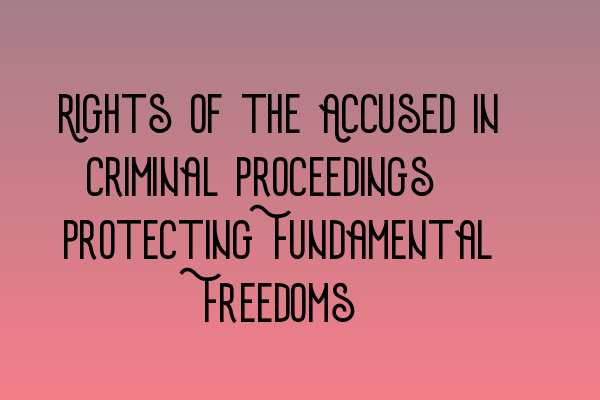Rights of the Accused in Criminal Proceedings: Protecting Fundamental Freedoms
When it comes to criminal proceedings, one of the fundamental principles of justice is the protection of the rights of the accused. These rights serve as the bedrock of our legal system, ensuring fairness and equality before the law. In this blog post, we will explore the rights of the accused in criminal proceedings and highlight their importance in safeguarding our fundamental freedoms.
Presumption of Innocence
First and foremost, every individual accused of a crime is entitled to the presumption of innocence. This means that, until proven guilty beyond a reasonable doubt, the accused is considered innocent. This principle underscores the burden on the prosecution to present sufficient evidence to establish guilt. To learn more about the burden of proof in criminal cases, check out our article on SQE 1 Practice Exam Questions.
Right to Legal Representation
Another vital right of the accused is the right to legal representation. This ensures that every individual facing criminal charges has the opportunity to seek legal advice and be represented by a qualified solicitor. Legal representation plays a crucial role in protecting the rights and interests of the accused throughout the criminal proceedings. If you’re looking for SQE 1 preparation courses to enhance your legal knowledge, check out our article on SQE 1 Practice Mocks FLK1 FLK2.
Fair and Impartial Trial
A fair and impartial trial is a fundamental right guaranteed to every accused. This means that the court must provide a neutral and unbiased environment for the determination of guilt or innocence. It ensures that the accused is given an opportunity to present a defense, confront witnesses, and challenge the evidence against them. To prepare for SQE 2 examinations and enhance your legal skills, explore our comprehensive SQE 2 Preparation Courses.
Protection against Self-Incrimination
The right against self-incrimination is a crucial protection afforded to the accused. This means that the accused cannot be forced to make statements or provide evidence that may be used against them in court. It ensures that individuals are not coerced into admitting guilt or providing evidence harmful to their defense. If you’re interested in preparing for the SQE 1 exam, we offer comprehensive SQE 1 Preparation Courses.
Access to a Speedy Trial
Timely justice is another essential right of the accused. Access to a speedy trial ensures that individuals are not subjected to undue delay, which can negatively impact their lives and well-being. This right serves to protect the accused from prolonged periods of uncertainty, allowing for a fair and efficient resolution of their case. For important SRA SQE exam dates, visit our article on SRA SQE Exam Dates.
Conclusion
The protection of the rights of the accused in criminal proceedings is vital to the integrity and fairness of our criminal justice system. These rights, including the presumption of innocence, right to legal representation, fair and impartial trial, protection against self-incrimination, and access to a speedy trial, ensure that the accused’s fundamental freedoms are upheld. By recognizing and safeguarding these rights, we can strive for a more just and equitable society.
